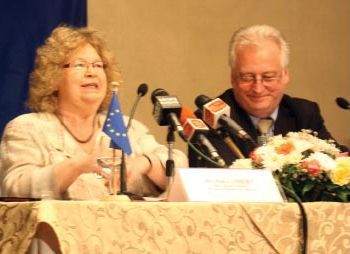
Publisher:
Bonnie King
CONTACT:
Newsroom@Salem-news.com
Advertising:
Adsales@Salem-news.com

~Truth~
~Justice~
~Peace~
TJP
May-07-2012 18:58

 TweetFollow @OregonNews
TweetFollow @OregonNews
LLRC Recommendations Highly Credible EU Delegation
Easwaran Rutnam Special to Salem-News.comMany of us in the EU Parliament and in our own Resolution felt that well there are issues to be dealt with and I think it is important that we do not let things slide from the agenda. - Jean Lambert
 Jean Lambert and Bernard Savage at a press conference. Photo by Thusitha Kumara |
(COLOMBO, Sri Lanka Sunday Leader) - A parliamentary delegation from the EU visited Sri Lanka last week, its second mission to the country over the past two years. The delegation was headed by EU Parliament MP Jean Lambert. The visit comes just weeks after the EU supported a Resolution on Sri Lanka at the UN Human Rights Council. The Sunday Leader spoke to Lambert at the end of her visit.
Q: The government says the Resolution on Sri Lanka submitted at the UN Human Rights Council (UNHRC) recently was unwarranted. You have been around Sri Lanka during your current visit and met a cross section of society as well as government and opposition members. Following this visit do you think such a Resolution was needed or as the government says was unwarranted?
A: I will stand by the European Parliament having the Resolution on Sri Lanka and the Resolution at the UN Human Rights Council. I think it was very important to mark the publication of the LLRC report and to mark the very important recommendations that are in the report. This will say to the government of Sri Lanka, okay here is a way to move forward. Many of us in the EU Parliament and in our own Resolution felt that well there are issues to be dealt with and I think it is important that we do not let things slide from the agenda. When you look at some other countries as well there have been instances where when the visual side of the war is over then things are almost forgotten. For many of us that feels very wrong. To show that we are still concerned. So I think from that point of view the Resolution is important.
Q: So what are you most concerned about? Why is the UNHRC wanting to keep Sri Lanka on the agenda now, three years after the war?
A: Well the headline kind of thing would be more than to be concerned about anything. It is to say that look well we recognize that the LLRC report is important because earlier there was a lot of skepticism before the report was published that this was actually going to be a very bland report. But many were very encouraged that it is actually a very strong report. It has very thought through recommendations and therefore I think it is useful that the human rights committee has said that this is a report to reckon with and worth following through. We need to value the report and that is a very important signal from the international community.
Q: So now there is no credibility issue with the LLRC or its report? Because this was an issue when the LLRC was appointed. Many felt the LLRC will not be credible since it was appointed by the government.
A: I think in terms of the recommendations itself most feel that the recommendations are highly credible. I think there are still many who will say in terms of the examination maybe the events leading up to the end of the conflict, there are still other questions which could be asked there. But in terms of the direction of the report, I think that many generally are very encouraged to see what has come from that.
Q: Has that been the response from the Tamil political parties or the Tamil community you met during this visit, that they are encouraged by the recommendations of the LLRC?
A: Yes. Well the people we met here felt the recommendations are positive. But even some from the Tamil Diaspora we met in Brussels and the UK and Tamil communities in a number of EU states have actually been positive and almost like relieved that it’s a serious report. There may well have some criticism over parts of it but generally people who I have had discussions with say yes there are some very very solid recommendations there.
Q: But then accountability has not been addressed in the report and that has been a concern for even the Tamil Diaspora. So how would you advice the government to address accountability?
A: Well every government must address accountability in its own way. In South Africa you have the Truth and Reconciliation Commission which is still ongoing. Rwanda has dealt with things differently. Bangladesh is now having war crimes trials. Countries deal with this differently. I do not think there is a specific way. But in terms of dealing with the issue I think it is important that people feel it is being addressed. People feel that it is coming from the Tamils but there are also people in the Muslim and Sinhala communities too who may also have suffered in this, who may also have found that family members have disappeared. They would also want to know and feel that the right people are being identified as being involved in this. All parts of the community have suffered so it should be a rounded process.
Q: Would you agree that war crimes did take place? This term “war crimes” in fact is a term the government gets very agitated about. Would you use that term as well on the Sri Lankan issue?
A: It is certainly one that I have used. When we classify this as a war then you know you cannot be surprised if people classify this as war crimes. If it helps not to use those words or that term, then fine. I do not know if people will be happy with the term atrocities, death or whatever the vocabulary is. I think people are worried about the war crimes side of it because of the whole international criminal court or war crimes tribunal, etc. and certainly there will be those that will push for that.
Q: Is the IDP issue still a concern since there are still a few people in camps?
A: Yes it is still a concern. Resettlement is a key issue and a needs-based resettlement will be good. The European Union is certainly ready to put in some money to help with the housing. But it is also around land rights, the demining program and a number of issues.
Q: Have the reports of cluster bombs possibly being used during the war been of any concern to you?
A: Any unexploded ordnance is of concern and I think this is also part of coming to terms with what has actually gone on during the war. This should also be part of some form of inquiry. But cluster bombs are in the European context a really bad thing and a real danger to particularly children.
Q: On General Sarath Fonseka’s detention: what is the EU delegation looking for? His release or a fair trial?
A: A fair trial. This is what we have even said about long term detainees. It should be either charge or release and then it has to be fair trial. So that this is out in public. If there is a charge to answer the place to do it is in the court.
 |
 |
 |
 |
 |
 |
 |
Articles for May 6, 2012 | Articles for May 7, 2012 | Articles for May 8, 2012

Quick Links
DINING
Willamette UniversityGoudy Commons Cafe
Dine on the Queen
Willamette Queen Sternwheeler
MUST SEE SALEM
Oregon Capitol ToursCapitol History Gateway
Willamette River Ride
Willamette Queen Sternwheeler
Historic Home Tours:
Deepwood Museum
The Bush House
Gaiety Hollow Garden
AUCTIONS - APPRAISALS
Auction Masters & AppraisalsCONSTRUCTION SERVICES
Roofing and ContractingSheridan, Ore.
ONLINE SHOPPING
Special Occasion DressesAdvertise with Salem-News
Contact:AdSales@Salem-News.com

Salem-News.com:
googlec507860f6901db00.html

Terms of Service | Privacy Policy
All comments and messages are approved by people and self promotional links or unacceptable comments are denied.
[Return to Top]
©2025 Salem-News.com. All opinions expressed in this article are those of the author and do not necessarily reflect those of Salem-News.com.